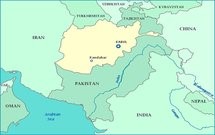 Many observers have overlooked some of the ancillary regional consequences of the U.S.-Iran deal. As the United States and Iran reached the agreement, Washington encountered trouble with Iran's eastern neighbor, Afghanistan. Afghan President Hamid Karzai would not sign the bilateral security agreement that would authorize a residual American force in Afghanistan after 2014. The standoff will be short-lived, but in light of the U.S.-Iran deal, battles will continue to take place in Afghanistan between two historic rivals: Saudi Arabia and Iran, which is now poised to play an unprecedented role in the region.
Many observers have overlooked some of the ancillary regional consequences of the U.S.-Iran deal. As the United States and Iran reached the agreement, Washington encountered trouble with Iran's eastern neighbor, Afghanistan. Afghan President Hamid Karzai would not sign the bilateral security agreement that would authorize a residual American force in Afghanistan after 2014. The standoff will be short-lived, but in light of the U.S.-Iran deal, battles will continue to take place in Afghanistan between two historic rivals: Saudi Arabia and Iran, which is now poised to play an unprecedented role in the region.
U.S. National Security Adviser Susan Rice left Kabul on Tuesday after warning Karzai that if he did not sign the bilateral security agreement Washington would have to withdraw all of its troops from Afghanistan by the end of next year. That probably will not come to pass; Karzai is simply posturing to get additional concessions from Washington, many of which involve Karzai trying to remain relevant once a successor takes office after presidential elections in April 2014. Considering that Afghanistan needs U.S. support to deal with the Taliban insurgency after NATO completes its drawdown next year, Karzai will sign the agreement sooner or later.
The bilateral security agreement aside, Afghanistan may have just become a key battleground between Saudi Arabia and its regional rival, Iran. This geopolitical struggle has played out along the northern rim of the Middle East and across Iran's western flank, but the U.S-Iran deal may have aggravated the situation. Saudi Arabia became wary of Iran's ascendance when the United States invaded Iraq in 2003, and now Riyadh fears that Tehran will become even more powerful -- not as an unpredictable actor pursuing a radical foreign policy agenda, but as a rehabilitated member of the international community.
No longer a pariah of the international community, Iran will be able to project power with greater ease than before, especially on its eastern frontier, where Afghanistan represents a potential security threat, because of long-standing Saudi influence. In fact, the Iranians believe that the recent surge of attacks by ethnic Sunni Islamist militants in southwestern Sistan and Baluchestan province, which borders Afghanistan and Pakistan, is the work of Saudi proxies that were reactivated after the U.S.-Iranian rapprochement.
But Afghanistan could also provide an opportunity for Iran. Given its historic ethnic, linguistic and sectarian ties, Iran has a great deal of influence in the country. In recent years, Tehran has enhanced its influence in Afghanistan through the Persian-speaking minority communities, by supporting the Karzai regime and by developing ties to elements within the Taliban. As Washington moves toward a drawdown from Afghanistan and improves ties with Tehran, the Americans and Iranians are likely to coordinate on containing Sunni Islamist militancy in the southwest Asian nation.
Washington had hoped that Pakistan would help manage Afghanistan after 2014. However, Pakistan has been severely weakened by the war and is now struggling with its own domestic jihadist insurgency. Simply put, it has lost a lot of its leverage in Afghanistan.
However, the Pakistanis are unlikely to sit back and allow the Iranians to fill the void. The Saudis, who have an especially close relationship with the current government in Islamabad, will come in and exploit Pakistani vulnerabilities to further their own strategic imperative: countering a rising Iran. For its part, Pakistan, having been disaffected by a long history of supporting Islamist militants and having become a major battleground for anti-Shia violence, would want to avoid a firm alignment with Saudi Arabia.
But there is reason to believe Islamabad would cooperate somewhat. Economically, Pakistan is in dire straits, and its relationship with Saudi Arabia, a fellow Sunni state, keeps it within Riyadh's sphere of influence. Already, the Saudis are working closely with the Pakistanis to support Sunni rebels in Syria, especially after the United States backed away from the idea of regime change in Damascus. And because Saudi-Pakistani cooperation against Iran would very likely take place in Afghanistan, Sunni Islamist militancy in Afghanistan and Pakistan could increase dramatically.
Such an outcome is unlikely to help Saudi Arabia undermine Iran. In fact, Washington and Tehran could become even closer if this threat ever materializes. The ensuing proxy war would lead to a greater rise in Islamist extremism and terrorism in Afghanistan and Pakistan.
Courtesy : Stratfor (www.stratfor.com)